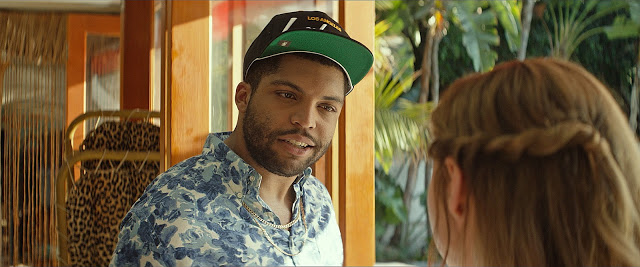Obsession goes dark in Ingrid Goes West, Matt Spicer’s funny and sad debut feature about a profoundly lonely person and the phony friendship she foists upon a vapid quasi-celebrity. The misery and the menace of the stalker is nothing new in cinema—Spicer’s screenplay (co-written with David Branson Smith) even name-checks Single White Female—but here the trope of classical fixation is, ahem, filtered through the distinctly modern lens of social media. The movie’s protagonist is decidedly deranged, but she’s also strangely sympathetic, perhaps because she represents the logical extreme of a culture that tallies friends and competes for followers. When you’re constantly uploading exquisite images of your sun-kissed California lifestyle to thousands of adoring fans, isn’t it only rational to expect a rando from Pennsylvania to become unhealthily attached to you? #justsaying
Not that Ingrid Goes West is a crotchety, Luddite take on How We Live Now. While the script exhibits fluency in the linguistic and behavioral quirks of social media—the hashtags and emojis, the constant scrolling and double-tapping—it is too smart and savvy to insult an entire generation of potential customers. Ingrid Goes West is persistently scathing, almost as a matter of principle, but it directs its scorn toward its characters, not its viewers. And while it uses contemporary technology as its entry point, the feelings that it traffics in and stirs up—loneliness, jealousy, fervor, fear—are emphatically age-old. #instawisdom
The film runs a brisk 97 minutes, and its prologue is a model of efficient exposition, the screenplay delivering the essential information without resorting to stilted voiceover or clumsy info-dumps. Briefly committed to a psychiatric ward after macing a bride at her wedding, Ingrid (an excellent Aubrey Plaza) resolves to rein in her more maniacal impulses. But after she comes across a puff piece about a rising socialite with 267,000 Instagram followers named Taylor (Elizabeth Olsen, possibly leveraging her experience growing up in a house with two mega-celebs), she falls into old patterns, obsessing over this golden-haired goddess she’s never met. Ingrid comments on one of Taylor’s pics—in an insightful bit that will speak to anyone who’s ever gone to great lengths to appear nonchalant when texting a crush, she agonizes over her comment, eventually settling on something that she feels threads the needle between meaningful and casual—and when Taylor actually deigns to respond, Ingrid is hooked. Withdrawing the entire inheritance left to her by her recently deceased mother, she departs the Mid-Atlantic for sunnier skies. #YOLO
Structurally speaking, Ingrid Goes West proceeds—#spoileralert—pretty much as you’d expect. In a sense, it hits all the marks of a typical romantic dramedy: the meet cute, the growing closeness, the sudden (and rather convenient) complications, the breakup and attendant heartache. The difference, of course, is that Ingrid feverishly engineers her friendship with Taylor from the outset, using her Instagram feed to track her whereabouts and learn her preferences. The fateful encounter where Ingrid ingratiates herself with Taylor and her husband, Ezra (Wyatt Russell, from Everybody Wants Some!!), arises through an intrepid bit of dognapping, and oh, isn’t that just the perfect bottle of rosé she brought to a dinner party? #foodporn
By any objective standard, Ingrid’s behavior is psychotic. But one of the shrewdest things about Ingrid Goes West is that it spares no one from its lacerating judgment, revealing all of its characters—not just its unhinged anti-heroine—as phonies. Taylor initially scans as glamorous and worldly, but she proves to be a liar and a schemer, blithely using her celebrity cachet as a manipulative weapon. (In one of the film’s funniest scenes, she asks a mechanic to take a quick photo of her and Ingrid for her Instagram, then politely demands that he lie on the ground to get the angle right, becoming a beaming variation of Orson Welles.) And Ezra pathetically styles himself a “pop artist”, which is quickly decoded as a vague label designed to camouflage his inability to actually sell any of his paintings. Even Ingrid’s landlord, Dan (O’Shea Jackson Jr., very good), introduces himself as a successful screenwriter, only to quickly reveal that he’s a Batman fanboy who hopes Chris Nolan and company will take a look at his spec script. #squadgoals
Perhaps the only genuine presence in the movie is Nicky (Into the Woods’ Billy Magnussen), Taylor’s high-strung and obnoxious brother, whose unannounced arrival at the film’s halfway point catalyzes its turn from sycophantic helplessness into outright ugliness. Something of a hanger-on himself, Nicky instantly pegs Ingrid as a fraud, forcing her to take increasingly drastic measures to shield Taylor from her secret and retain their manufactured friendship. I won’t reveal the depths of her desperation, just that her strategy involves ski masks, a crowbar, and a teenager punching her in the face. #ingridgoesnuts
In following Ingrid’s descent into madness, Ingrid Goes West may be predictable, but it’s consistently entertaining. What’s more, Spicer displays a strong facility with the material, translating what is a fundamentally static activity—much of the movie involves people simply looking at or typing on smartphones—into the visual language of cinema. (As a Twitter aficionado but Instagram agnostic, I took the movie’s choice of platforms personally, and also deduced that I should probably tweet less and gram more. #FAIL)
At the same time, there’s a thinness to Ingrid Goes West that feels like a missed opportunity. It’s prudent that Spicer doesn’t ridicule the entire social media industrial complex too aggressively, but it also means that he doesn’t have much new to say on the subject. Indeed, the movie never satisfactorily explains why Ingrid becomes so obsessed with Taylor in the first place, and while the retort to that complaint is obvious—that there isn’t a reason, that Ingrid is just disturbed—that answer simply exposes the script’s core emptiness. This makes the hysteria of the film’s second half feel contrived, and it also illustrates why Nicky feels less like a person than a plot device. #sorrynotsorry
Then again, maybe it’s better to view the movie not as an acerbic satire of Instagram but as a sad character study of a deeply damaged person. And the reason Ingrid Goes West works as well as it does—really, the reason it works at all—is its lead actress. Cutting her teeth as a comic glowerer (on TV in Parks & Recreation and in films like Funny People and Scott Pilgrim vs. the World), Plaza finally earned herself a few starring roles in low-key rom-coms like Safety Not Guaranteed and The To Do List. She was good in those, but earlier this year on FX’s Legion, Plaza began showcasing the extent of her powers, and she’s equally mesmerizing here, quietly tapping into Ingrid’s underlying melancholy without sacrificing an ounce of her volatility. It’s a bold and rewarding performance, equal parts funny, scary, and poignant. Ingrid Goes West is far from a great movie, but it’s fitting that a film founded on a vertiginous pile of lies ends up being rescued by a performance of absolute truth. #nofilter #blessed
Jeremy Beck is the editor-in-chief of MovieManifesto. He watches more movies and television than he probably should.




